

Whereas nine million people live in Mexico City, the government reportedly only provides fewer than 45 emergency ambulances to cover the entire population’s accidents and injuries. With such a shortfall, the logic outcome is the rise of an alternate industry of private ambulances. However, success and profit are not guaranteed, and many of those involved have no real training or certification. They learn by doing, acting like impromptu paramedics for the injured who otherwise would not receive immediate first aid and available transportation.
This is the case for the Ochoa family, who are among the many entrepreneurs in this unstable business, and their complicated nocturnal wanderings are closely tracked by Luke Lorentzen. The American filmmaker has lived in Mexico for many years; his exploration is not from the perspective of a stranger.
Intricacies, contradictions, and nightly dilemmas behind a private ambulance enterprise are filtered through the Ochoas’ experience in the field. They drive overnight, intercepting emergency calls that public services will not attend. Fer is the head of the family and father of the two other crew members, but he’s not exactly in charge.
He co-drives alongside his 17 years-old son Juan and follows his orders. Juan’s confidence in finding solutions and his constant concern for details are surprising initially. There’s something appealing about his man-boy appearance compared to his adult behavior as he carries the heaviest responsibilities in the family business. Everyone looks to him to make decisions. Finally, little brother Josué is a preadolescent who doesn’t try to act above his age. Maybe the entire endeavor is a game to him, though he is as proactive as often as he’s a complainer.
Life and work seem intimately blended for the trio, which raises more questions than answers on how they feel about their trade or if there is a real possibility to afford a life beyond work. Viewers occasionally hear Juan talking on his phone with a girlfriend, albeit the rest of the conversations between them are focused on urgent matters of money and expenses to be covered.
To deal with injured who require medical attention demands quickness, discipline, and absolute control over emotions. First, the family needs to reach the accident before another rival ambulance company arrives. While Juan conducts the injured to a closer hospital and Fer attends the ill in the ambulance, they are fearful about the lack of payment or an untimely police inspection. Some patients claim that they don’t have money or insurance coverage. Others create a fuss that compels the Ochoas to give up asking, fearing that police would be called. How they live within a lean budget and also maintain the ambulance in good condition is a relentless question mark.
Some of the cases attended by Ochoa’s family build a sharp depiction of Mexico City, disclosing severe problems, and not solely regarding health care. For example, a young woman is beaten by her boyfriend, but she doesn’t want to call her parents. But if she doesn’t call them, who’s going pay for the ambulance service? Juan affirms that if weren’t for people like the Ochoas, the city would collapse.
One remarkable aspect of the film is the fleeting and vertiginous vision of a dynamic and dangerous city—you can’t find better guides than these ambulance drivers. Also noteworthy is how the camera is quietly located behind the patients while they are attended, almost always from their perspective; probably because the filmmaker was not allowed to record their faces. Intentionally or not, the effect enriches the final result. It produces a sensation of intimacy where the audience witnesses the dutiful work of the Ochoa clan. In some way, we feel treated by them as their patients.
Beyond the candid family portrait, Midnight Family is riveting and valuable as an exposé of a way of life.
Released by 1091 Media
Spanish with English subtitles
Mexico. 81 min. Not rated






Leave A Comment